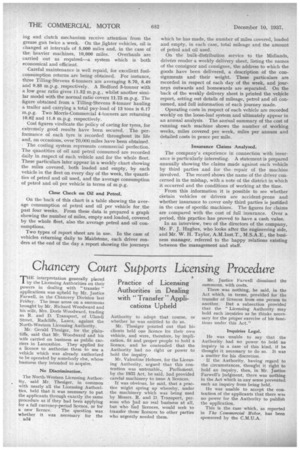Chancery Court Supports Licensing Procedure
Page 16

If you've noticed an error in this article please click here to report it so we can fix it.
Practice of Licensing Authorities in Dealing with "Transfer" Applications Upheld
rr`l-IE interpretation generally placed 1 by the Licensing Authorities on their powers in dealing with " transfer " applications was upheld by Mr. Justice Farwell, in the Chancery Division last Friday. The issue arose on a summons brought by Mr. Richard Woodward and his wife, Mrs. Doris Woodward, trading as R. and D. Transport, of Ulandi Street, Radcliffe, Lanes, against the North-Western Licensing Authority.
Mr: Gerald Thesiger, for the plaintiffs, said that Mr. Woodward and his wife carried on business as public carriers in Lancashire. They applied for a licence to authorize them to use a vehicle which was already authorized to be operated by somebody else, whose business they intended to acquire.
No Discrimination, The North-Western Licensing Authority, said Mr. Thesiger, in common with nearly all the Licensing Authorities, held that it was necessary to put the applicants through exactly the same procedure as if they had been applying for a full currency-period licence, or for a new licence. The question was whether it was necessary for the 1334
Authority to adopt that course, or whether he was entitled to do so.
Mr. Thesiger pointed out that his clients held one licence for their own vbhicle, and were, therefore, by implication, fit and proper people to hold a licence, and he contended that the Authority had no right or power to hold the inquiry.
Mr. Valentine Holmes, for the Licensing Authority, argued that this contention was untenable,. Parliament, by the 1933 Act, he said, had provided careful machinery to issue A licences.
It was obvious, he said, that a practice might spring up whereby, under the machinery which was being used by Messrs. R. and D. Transport, persons who had no real business at all, but who had licences, Would seek to transfer those licences to other parties who urgently needed them.
Mr. Justice Farwell dismissed the summons, with costs.
There was nothing, he said, in the Act which, in terms, provided for the transfer of licences from one person to another. But a subsection provided that the "Licensing Authority may hold such inquiries as he thinks necessary for the proper exercise of his functions under this Act."
Inquiries Legal.
He was unable to say that the Authority had no power to hold an inquiry in a case of this kind, if he thought it necessary to do so. It was a matter for his discretion.
If the Authority, having regard to the circumstances, thought it right to hold an inquiry, then, in Mr. Justice Farwell's judiment, there was nothing in the Act which in any sense prevented such an inquiry from being held.
He was unable to accept the contention of the applicants that there was no power for the Authority to publish the application.
This is the case which, as reported in The Commercial Motor, has been sponsored by the C.M.U.A.




























